
Alphabetical Menu
Chronological Menu
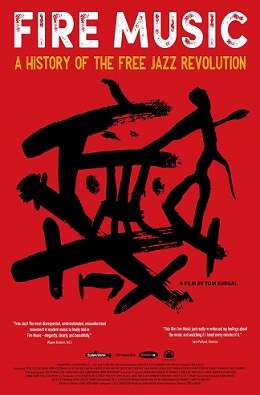
Fire Music is an insightful documentary about the free jazz movement of the 1960's and 70's. Director Tom Surgal does a decent job of introducing free jazz to audiences previously unfamiliar with it. Free jazz musicians like Ornette Coleman, Sun Ra, John Coltrane revolutionized jazz by playing it without following conventional structures of jazz music. Surgal combines archival footage of those iconic jazz musicians, among others, with talking head interviews that shed light on the movement. The pace moves quickly, though, and sometimes too quickly, which makes it feel exhausting at times and hard to absorb the information all at once. While it's great and refreshing that Fire Music sheds light on a jazz movement that hasn't been explored so in depth in another doc before, it doesn't allow enough room for the film to breathe and let the jazz music speak for itself. Concurrently, it doesn't delve enough into the historical events that surrounded the free jazz movement which would've contextualized it. Summer of Soul is a better example of a music documentary that blends history, musicians and their music in a more entertaining, moving and profound way. The same can be said about the powerful Standing in the Shadows of Motown. Both of those films transcend their subject matter. Although director Tom Surgal's passion for jazz, particularly free jazz, is evident throughout Free Music, the doc doesn't quite cohere into a thoroughly engaging film. At a running time of 1 hour and 28 minutes, Fire Music is illuminating, but just mildly engaging without transcending its subject matter like more powerful and moving music docs manage to do. It opens at Film Forum via Submarine Entertainment. 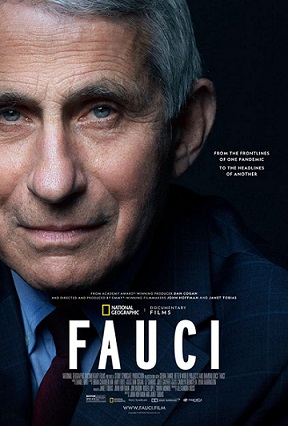
Fauci, directed by John Hoffman and Janet Tobias, is a conventional documentary about the life and work of Dr. Anthony Fauci, the world-famous director of the National Institute of Allergy and Infectious Disease and Chief Medical Advisor to the President of the United States. It's a somewhat hagiographic biography of someone who has been in the limelight for quite some time, moreso during the pandemic. The filmmakers are fortunate to have access to Dr. Fauci, so you'll hear plenty straight from the horse's mouth in interviews with Dr. Fauci himself. They don't question what he says, though, nor do they ask him any deep questions like how he handles all the pressure that comes from his work or more challenging ones with tough answers like how he feels about any conflicts of interest between pharmaceutical industries and the governing agencies like the FDA. How does he remain so calm and almost zen-like on camera? They pretty much play it safe and let Dr. Fauci appears to the audience as a kind, compassionate and gentle human being. Doesn't he get angry? He does get the chance to chalk up some tears when he recalls his work trying to fight the AIDS epidemic years ago. It's hard to tell if who you're watching is Dr. Fauci "behind the curtain" or in front of the curtain, so-to-speak. He could still be putting on a performance just to protect his image which would make sense for him to do. There's too much at stake for him if he were to look too flawed even though that would've made him all the more human. He has many roles to play besides the roles in medicine and politics, but he's also a father, a husband and a human being. Which of those roles does he find the most and least challenging? It's not very clear, but what's indeed clear is that he has a passion for his job. Would he have as much passion for it if he made less money from it? That's yet another tough question that remains unanswered. The filmmakers should be commended, though, for respecting Dr. Fauci's boundaries by not delving into his private life with his family. At a running time of 1 hour and 44 minutes, Fauci is a harmless and mediocre documentary that's not as powerful as other documentary biopics like RGB, The Unknown Known or The Fog of War. It opens at Angelika Film Center via National Geographic Films and Magnolia Pictures before streaming on Disney+ on October 20th, 2021. Azor 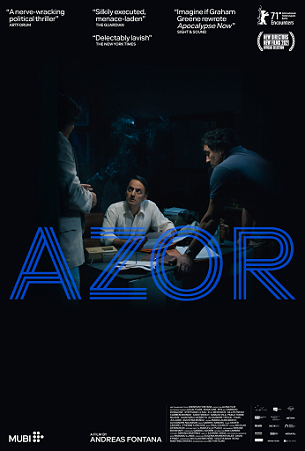 Yvan De Wiel (Fabrizio Rongione), a banker from Geneva, travels to Buenos Aires with his wife, Inés (Stéphanie Cléau), to replace René Keys, his partner. Keys disappeared mysteriously, so it's up to Yvan to begin where he left off while he tries to figure out how and why he disappeared in the middle of a dictatorship in Argentina. Azor is a difficult film to describe in terms of genre. To call it a suspense thriller would be unfair because there's very little that's thrilling. The screenplay by writer/director Andreas Fontana builds the suspense very gradually without escalating it while letting your imagination and anticipation do most of the work. You never get to meet René Keys although he's a character who's quite integral to the narrative. Why and how did he disappear? Was he killed? Is he being held hostage? Fontana doesn't spoon-feed the audience with much exposition--in fact, the explanation of what the title of the film means isn't included until later on. The unpredictability of the plot makes it all the more compelling because just when you think it'll go in one direction, it goes in a different one that's less Hollywood. It's not a mindfuck like Last Year at Marienbad nor as riveting as Z or The Lives of Others, but it's nonetheless intriguing. To be fair, Azor does feel rather emotionally cold and requires a lot of patience which is refreshing because most films nowadays feel rushed, especially during the third act. There are no gun fights, car chases or foot chases or supernatural twists. Instead, many scenes feel foreboding and creepy. In a way, it would be accurate to say that Azor is somewhat of a psychological horror film without a clear-cut villain nor a clear sense of the horror itself. The film moves along at a very slow pace which takes time to get used to, but that helps to make it more absorbing. It's great to watch a movie every now and then that isn't shot as though it were a music video. Slow burns take patience and patience can often be rewarding, so patient audience members will be able to appreciate the slow burn the most. Everything from the set design to the costume design and lighting helps to enrich the film and even add a little to its creepiness. Fabrizio Rongione is very well cast in the role of Yvan while Stéphanie Cléau gives a terrific performance as his wife. Everyone gives a natural organic which adds to the authenticity. At a running time of 1 hour and 40 minutes, Azor is an understated, intriguing psychological horror film. It would be an interesting double feature with last year's La Llorona. 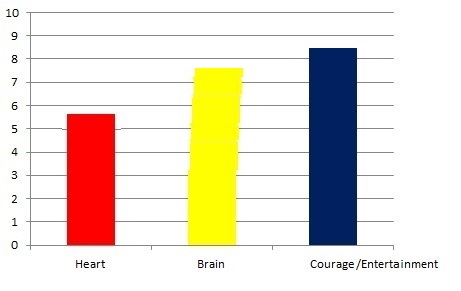 The Card Counter 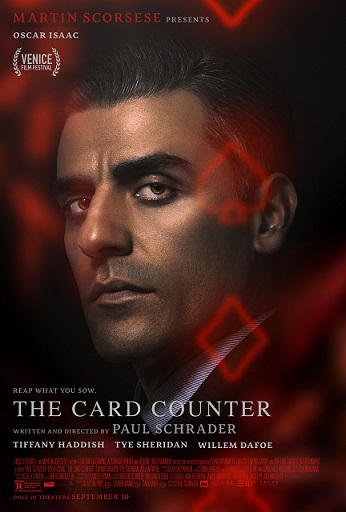
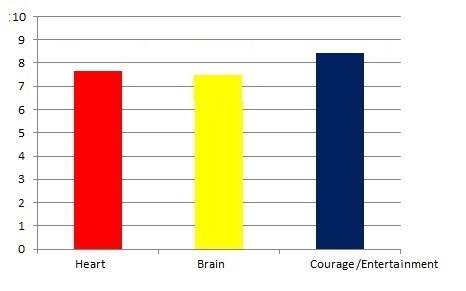 Language Lessons 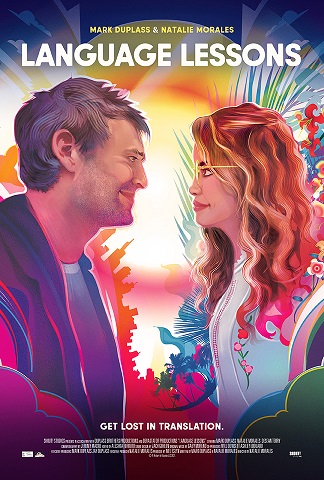
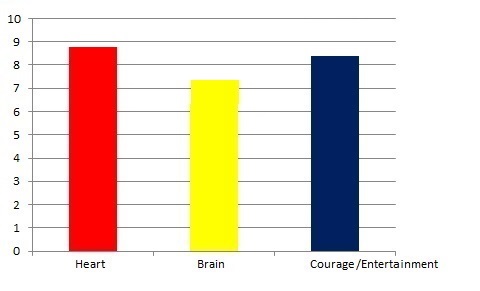 Prisoners of the Ghostland 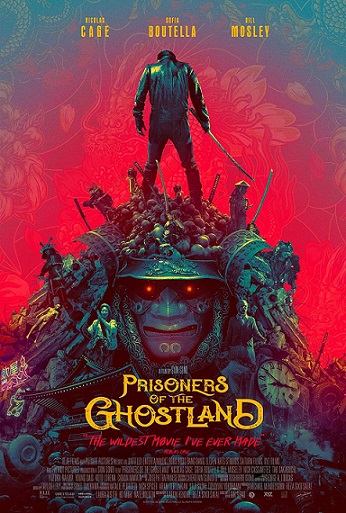
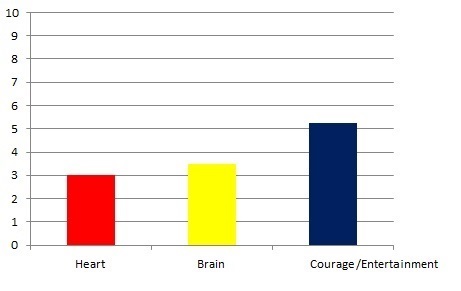 Small Engine Repair 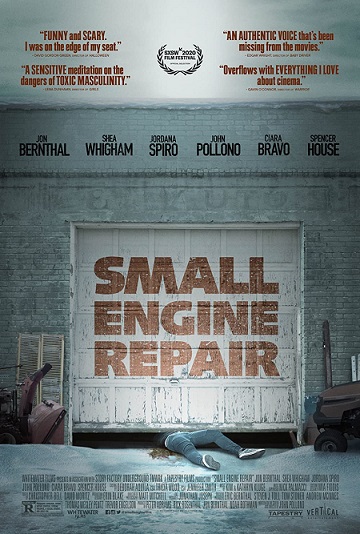 Frank (John Pollono), Packie (Shea Whigham), and Swaino (Jon Bernthal) have been friends since childhood while growing up in Manchester, New Hampshire. Frank's daughter, Crystal (Ciara Bravo), announces that she's been accepted to college. When Frank's ex-wife, Karen (Jordana Spiro), shows up, they head off to the local bar and end up in a fight before going their separate ways. Three months later, they reunite at Frank's machine shop where Frank hatches a plot to seek revenge against a drug dealer, Chad (Spencer House), for something that he did to Crystal. The screenplay by writer/director John Pollono takes a little time to get going as it spends the first half hour or so on exposition while introducing the characters of Frank, Packie and Swaino and providing a little backstory about their lives and relationships. Some of the exposition is shown through flashbacks which make the film more cinematic given its origins as a play, but it would've been great if Pollono had trusted the audience's imagination a little more. Pollono does a great job, though, of adding dark and outrageously funny comic relief without unevenness, i.e. a flashback involving a one night stand with someone's wrist watch getting caught somewhere very awkward---that sight does get left to the audience's imagination, fortunately. Once he takes the film into much darker territory, which won't be spoiled here, it gets quite intense and disturbing without going over-the-top like Tarantino does in Once Upon a Time...in Hollywood, although it does come close. Despite that it veers into crime thriller territory, Small Engine Repair is fundamentally a story about friendship, a father's love for his daughter and how that father takes matters into his own hands against someone who harmed her. His actions cross legal and moral boundaries, but, concurrently, it's a parent's duty, after all, to protect his or her own child against harm, both from themselves as well as from others. John Pollon, Shea Whigham and Jon Bernthal give solid performances as does Spence House in a supporting role. Frank, Packie and Swaino actually seem like friends and have great chemistry together. Their rapport is occasionally witty and, most importantly, feels real. It's refreshing that writer/director John Pollono doesn't resort to too many cliches like setting the film during the winter with lots of snow like in Fargo. He also doesn't rely on shaky cam to generate tension; the tension comes from the characters' motivations. They might not all be likable characters, except for Crystal, but they're nonetheless human beings rather than caricatures. That's a testament to the strengths of the screenplay. It's also worth mentioning that the final shot of the film is equally moving, haunting and powerful. At a running time of 1 hour and 43 minutes, Small Engine Repair manages to be gripping, heartfelt and wickedly funny. 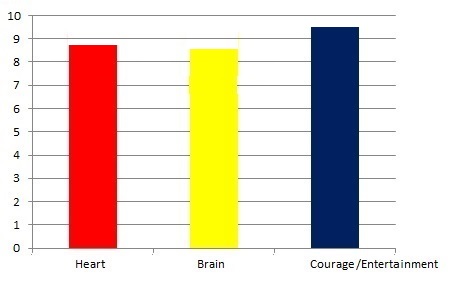 |